This week’s Parsha – Vayechi – concludes the Book of Genesis, the first of the “Five Books of Moses.” Traditionally, at the end of each book, the synagogue calls out in unison, “Chazak chazak venischazek!” Which means “Be strong, be strong and may we be strengthened,” thus giving us a little inspiration and charge to move on into the next book, as well as to empower us in our own individual and collective journeys. Typically, the words themselves leading up to this should provide such inspiration, so let us look at those words in this Parsha. Jacob blesses his children and passes away; the Torah then tells how the Jews begin to settle in Egypt. Joseph instructs them to please bury him, when the time comes, in the Holy Land. Then, to conclude, Joseph passes away and is entombed (temporarily, as per his instructions) in Egypt.
Seriously? That’s it? That’s our inspiration? If this were a cliffhanger for us to immediately binge-watch season 2, then I get it. But is this somehow supposed to leave us on a high note!? Joseph asks them to do something, and they don’t. The end. Really?
No, not really. The Torah is telling us something deeper. In truth, Joseph instructed his family to bury him in the Holy Land upon their return. They were about to begin a very difficult time period through slavery, infanticide, traveling the desert and just an overall “downtime.” And yet, Joseph tells them with his dying wishes, “you should bury me in the Holy Land.” The pendulum will swing back again. His words are prophetic and reassuring: You will get out of here and leave as free folk back to the land where you belong. You don’t believe me? Temporarily entomb me in Egypt, don’t send my remains up now, because I want to be here with you in your time of hardship, so you can look to me to know that there is an end in sight. Yes, it may get really tough but there is a light at the end of that dark tunnel. So then what is the empowerment that allows us to “be strong?” It is the knowledge that we have a leader who truly has skin in the game. Joseph isn’t just promising them something and then heading to the “celestial heights.” He is remaining there with them in Egypt until they are freed. The lesson for us is to take a page from Joseph. When someone we know is going through something, sure we can send our thoughts and prayers (I don’t mean to downplay those!) but let’s really try and put ourselves in their shoes. Let’s tap into our innate leadership (we all rule over ourselves, right?) and step up to the plate for someone else: What would we want if the tables were turned? And through this lesson, may we all be strengthened and empowered to continue on our journey. Good Shabbos!






